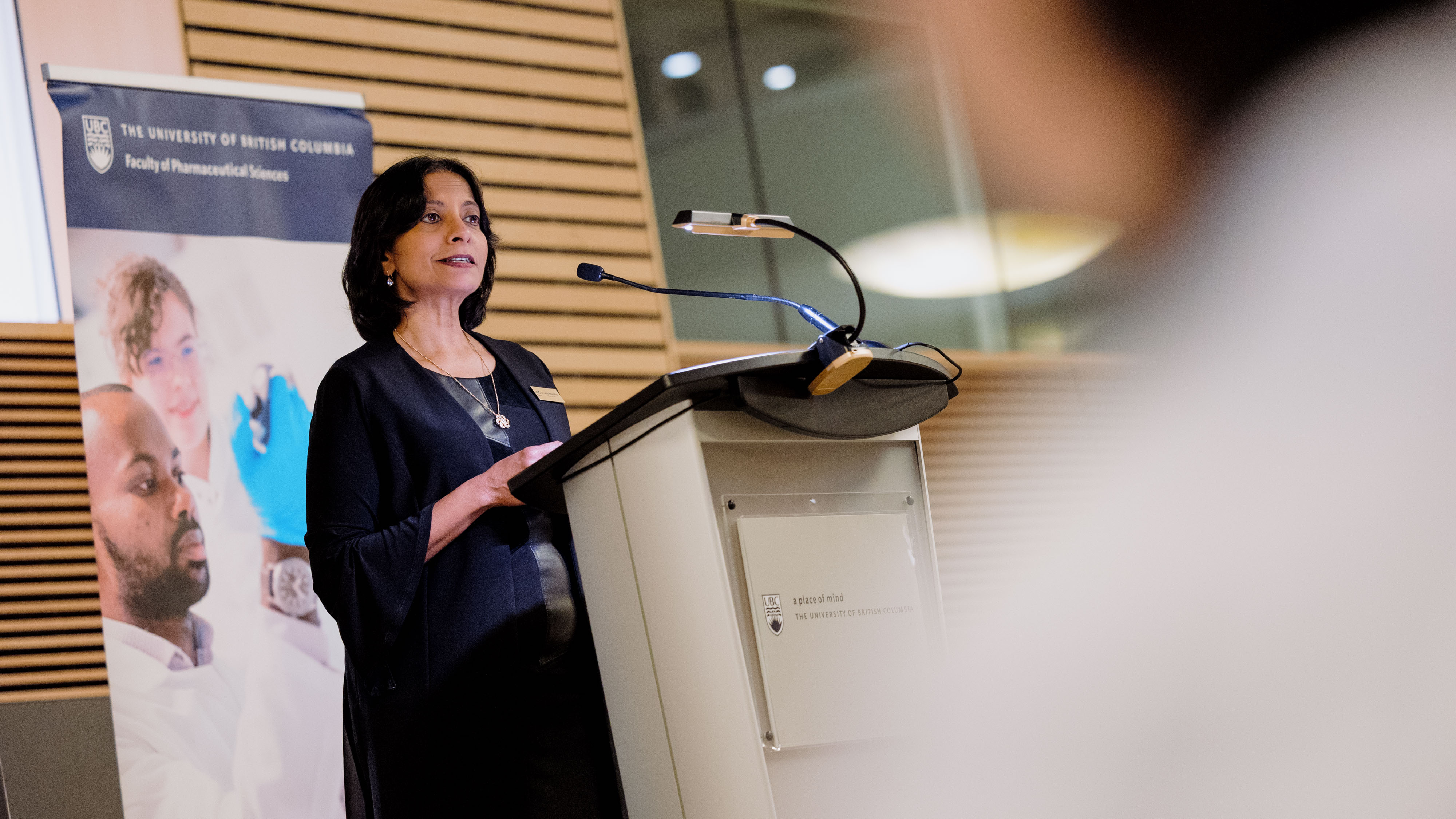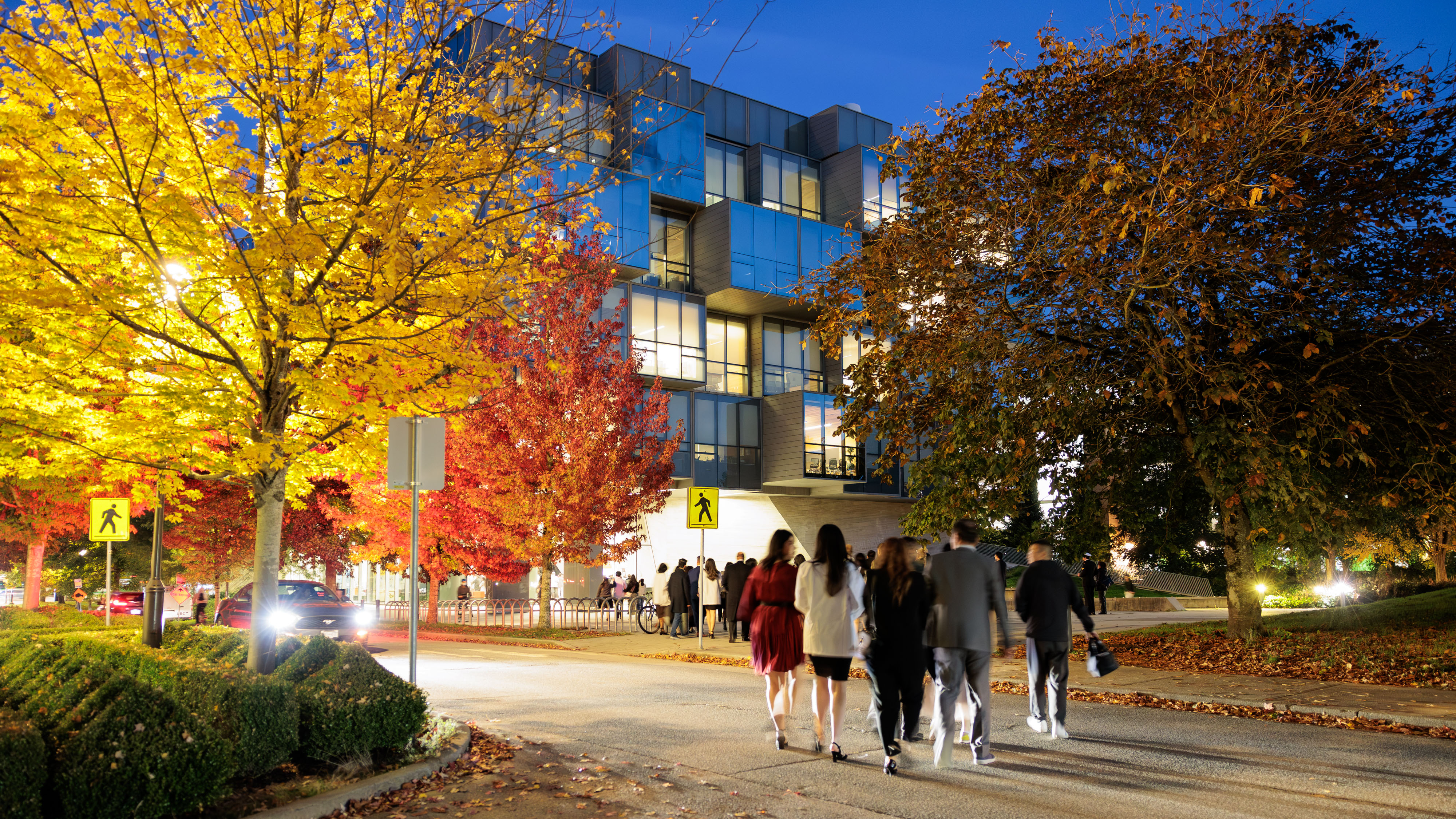The University of British Columbia’s Dean of the Faculty of Pharmaceutical Sciences, Lalitha Raman-Wilms, recently provided an update on her Faculty’s student recruitment efforts, particularly its increased efforts towards attracting students from rural and remote communities.
Raman-Wilms joined the Faculty as Dean on Oct. 1, 2024 and oversees more than 200 faculty members and staff in the Faculty. UBC’s Entry-to-Practice PharmD program requires students to have completed a minimum of two years of undergraduate studies, and it has been typical for pharmacy programs to recruit university students enrolled in programs in the sciences, she said. But more recently, the university has also started to focus on attracting high school students to consider pharmacy as a profession, through various outreach programs, some of which are described below.

Dean Lalitha Raman-Wilms delivers a speech to students in fall 2024.
One of them, the Verna J. Kirkness Education Foundation Program, aims to address an under-representation of First Nations, Metis and Inuit students in Canadian universities by offering scholarships to Indigenous students in Grades 11 and 12 to spend a week at a Canadian university learning with professors and their teams, and working with mentors as academic role models. In 2024, the Faculty hosted four students to spend a week at UBC, where they met with professors and visited various labs ranging from exploring nanomedicine, drug discovery, gene therapy, to learning about holistic medicines.
Another program, the Discover Pharmacy Tour, sends Faculty recruitment staff to rural communities to directly speak with students and teachers in high schools. In 2024, staff visited seven cities, including Prince George, Prince Rupert, Terrace, Castlegar, Kelowna and Courtenay.
A third, the Diversifying Health and Human Service Professions Education (D’HoPE) program, focuses on equity-denied high school and undergraduate students to develop a sustained interest in a health profession education program of their choice. Students are invited to visit the Faculty for a day to learn about careers in pharmaceutical sciences. Equity-denied students include people who are economically disadvantaged, first-generation university students, people with disabilities, people from the 2SLGBTQI+ community and more.
A fourth program is the Rural eMentoring BC online mentorship program, led by Dr. Sandra Jarvis-Selinger, which matches rural high school students with post-secondary student-mentors so the former can learn about pathways to university. The program has welcomed more than 1,400 rural high school students from more than 20 rural communities across 39 secondary schools since 2016. In 2024, ReMBC partnered with the Office of Student Services on a Directed Studies project, where two PharmD students presented to rural high schools about pathways to pharmacy careers, and prepared a report on barriers to health-care careers faced by rural students. The students were able to present at five rural high schools, and the high school students were most interested to learn about different career options as a pharmacist, salary and lifestyle, and the prerequisites needed for admission. This project will continue to be offered, and both units hope to better understand how to more effectively outreach to rural students.

Pharmacy students outside the Faculty of Pharmaceutical Sciences building at the University of British Columbia.
Rural recruitment has also been an advocacy focus of the BC Pharmacy Association. In November 2023, the Association presented eight recommendations to the Ministry of Health to mitigate challenges rural pharmacies and pharmacists are currently facing. Through a series of consultations, the Association heard from those who practice in rural communities that challenges include, but are not limited to, workforce shortages, difficulty in recruiting and retaining pharmacists and staff, lack of locum and relief support, lack of digital infrastructure, shortage of housing, and no formal support system for new graduates or out-of-province pharmacists considering rural practice.
Raman-Wilms said the Faculty’s long-term vision is to build a sustainable, robust, culturally responsive, and community-engaged approach to rural pharmacy education. The Faculty’s rural focus has been on areas outside Metro Vancouver and the Fraser Valley.
“Typically, rural communities are considered to be geographically distant from major urban centres and often may have limited access to health care services, including pharmacy care,” Raman-Wilms said. “In addition to location, there are also social and structural factors that can contribute to health-care inequities in rural areas, including barriers to transportation, health workforce shortages, and limited infrastructure.”
To that end, the Faculty has been increasing its efforts to encourage graduates to consider undertaking experiential education in rural communities; this, in addition to attracting students who come from rural communities, may facilitate many more graduates being interested in practicing within these communities. With respect to admissions, while the Faculty doesn’t explicitly set aside seats for rural students in the PharmD program, it is offering incentives to students from rural areas by waiving admission fees, and prioritizing the acceptance of the relatively few students who do come from those areas.
In 2024, the Faculty launched a Regional Practicum Model (RPM), which provides pharmacy students with the option of completing their concluding year 3 and 4 practicum experiences in a dedicated rural or remote region outside of the Lower Mainland. The current PharmD program requires each student to complete 40 weeks of practicums in a pharmacy practice setting. Students choosing to participate in the RPM can rank their preferred geographical locations from a list of options. In the first pilot of the Regional Practicum Model, seven students opted to participate and selected placements from the interior communities of Kelowna, Penticton, Vernon and Kamloops and their surrounding towns and villages. In 2025, the RPM was expanded to include Prince George and Victoria with 10 students opting to participate. One consideration of the RPM was that by inviting students to complete their full practicum experiences in a dedicated community, there would be less financial strain on students due to the reduced need for relocation and travel compared to completing practicums in different locations. Another is the hope that students would have increased interest in local career opportunities if they have already developed deep connections to these rural and remote communities. Currently, approximately 80 per cent of students enrolled in the PharmD program complete at least one practicum in a rural or remote community.
“What we know is that health profession education, such as medical training, that offer longitudinal rotations increases student comfort with the practice and student’s career decisions can be influenced by practices where they spend a significant amount of their training time. Creating more opportunities, and longitudinal rotations, in rural placements for students can support more pharmacy students to make a choice to stay in that community after graduation, or to choose a similar location” Raman-Wilms said.
“Through the Faculty’s initiatives such as the Regional Practicum Model, enhanced interprofessional learning experiences, and targeted recruitment of students from rural areas, we are working to ensure that future pharmacists are well prepared with the clinical knowledge with the full scope of practice, and also with the contextual understanding and lived experiences that supports long-term practice in rural and remote settings.”
Additionally, in 2024, the Faculty launched a new online elective course, called Exploring Rural Pharmacy Practice. Several rural pharmacists contribute to this course as guest lecturers, sharing their practice experiences and working with students to complete projects that address community-identified priorities and needs. The aim is to expose students to rural pharmacy practice early in the program and encourage these second-year students to consider future practicum and practice opportunities within these rural areas. Lori Bonertz, pharmacist and co-owner of four pharmacies in B.C.’s rural areas, contributed to this elective course as a project co-supervisor for students along with her pharmacist colleague Charissa Tonnesen and Tania Bell, a nurse specialized in wound and ostomy care. One project involved developing an information resource for people newly diagnosed with type 2 diabetes, with another resource for people who recently had surgery requiring an ostomy. These resources are now on their pharmacy websites.
“Students should consider taking this elective because it can provide a real-world perspective on specific conditions. The students get some exposure to the challenges and rewards of working in smaller, more remote communities,” Bonertz said.
“They may gain some appreciation of collaboration between health care professionals in rural settings and the difficulty patients may face in accessing information, primary and specialist care, investigations for conditions, travel for treatment, and other considerations.”
For more information on:
- Rural eMentoring Program: eMentoringBC.com
- Rural Preceptorship: pharmsci.ubc.ca/register-be-experiential-partner, or email Drs. Janice Yeung janice.yeung@ubc.ca or Neelam Dhaliwal neelam.dhaliwal@ubc.ca.
